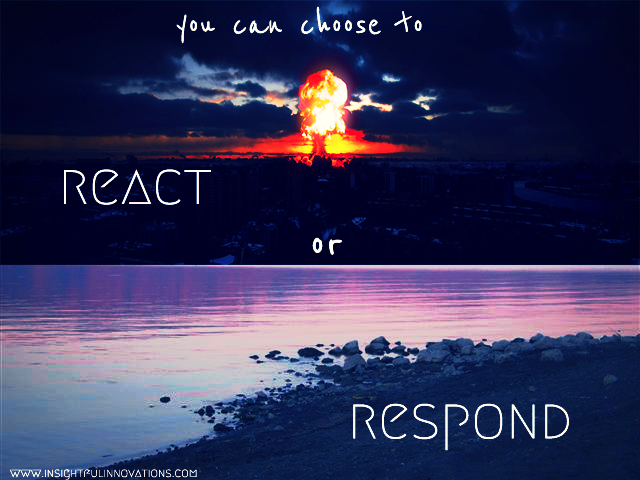React vs Respond

Have you ever thought - "Oh my goodness, I probably shouldn't have said that?"
It is likely to be certain that we have all been in a situation where something has happened or someone has said something and we have felt anger or frustration. The feeling of anger and frustration is human and perfectly normal but often when we are in the heat of the moment, we react to the situation and say things that might hurt someone else's feelings or we carry it with us throughout the day and let it ruin our day.
Last week, I made an assumption about something I thought I was right about. It was the end of the school day, I was busy trying to hand things out and get the kids ready to go home. One of my students made a comment and I made an assumption, based on what I thought I knew, that what he was saying was incorrect. He became frustrated with me and I became frustrated with the whole situation. Once I had done a little research, I realised I had made a mistake! Boy, did I feel bad! The only thing I could do was own it, apologise and try to make it better. For me, every situation like this comes with a lesson and the lesson we discussed the next day was the difference between reacting versus responding.
Reacting is when you let thoughts and emotions take over, and you get lost in the compulsive mental activity that ensues. It's an easy path, and there is always someone (or something) to blame for your behaviour.
Responding, on the other hand, means we take action to address what can be addressed. Once we do this, we let go and move on.

REACTING
![]() Reacting is engaging the body before the brain
Reacting is engaging the body before the brain
![]() Reacting is reflexive, reactive and impulsive
Reacting is reflexive, reactive and impulsive
![]() Reacting arises from a state of pain: frustration, anger
Reacting arises from a state of pain: frustration, anger
![]() Reacting is making assumptions, jumping to conclusions
Reacting is making assumptions, jumping to conclusions
![]() Reacting is giving away our power and self-control.
Reacting is giving away our power and self-control.
![]() Reacting is being short-sighted
Reacting is being short-sighted
![]() Reacting is allowing the ego to get in the way
Reacting is allowing the ego to get in the way
![]() Reacting is based on fear
Reacting is based on fear
![]() Reacting can have a problem-oriented mindset
Reacting can have a problem-oriented mindset
The issue is, how you react might affect your state of being for some time. You can probably recall a situation that caused you to become caught up in thoughts and emotions, leading to a reaction that subsequently dictated your mood for hours. Maybe it ended up ruining your entire day!

RESPONDING
![]() Responding is engaging the brain before the body.
Responding is engaging the brain before the body.
![]() Responding is being informed
Responding is being informed
![]() Responding is putting the ego aside
Responding is putting the ego aside
![]() Responding is staying in control of ourselves
Responding is staying in control of ourselves
![]() Responding is letting go of control over the outcome of the situation
Responding is letting go of control over the outcome of the situation
![]() Responding is about calm and communication
Responding is about calm and communication
![]() Responding is about choosing to see things from a different perspective
Responding is about choosing to see things from a different perspective
![]() Responding is about being mindful
Responding is about being mindful
![]() Responding is based on love and respect
Responding is based on love and respect
![]() Responding has a solution-oriented mindset
Responding has a solution-oriented mindset
Being mindful helps us to be aware and practice changing behaviours that we have been conditioned to do. The goal is to create a space between the situation, and the thoughts and emotions about the situation.

![]() Take time to listen
Take time to listen
![]() Avoid trying to make assumptions about someone or a situation
Avoid trying to make assumptions about someone or a situation
![]() Don't carry around the burden of irritation and anger, because that burden only affects you - it does nothing to the person you are irritated or angry at.
Don't carry around the burden of irritation and anger, because that burden only affects you - it does nothing to the person you are irritated or angry at.
![]() Let go of the ego. The ego tells us we must be right but let's face it - we have a 50/50 chance of getting it wrong.
Let go of the ego. The ego tells us we must be right but let's face it - we have a 50/50 chance of getting it wrong.
![]() Your reactions and responses will have a ripple effect - on both little and big humans alike.
Your reactions and responses will have a ripple effect - on both little and big humans alike.
![]() Be patient with yourself when you mess it up. Learn the lesson. You can't change what has happened but you can change your response to what has happened.
Be patient with yourself when you mess it up. Learn the lesson. You can't change what has happened but you can change your response to what has happened.
![]() Life is happening FOR you not TO you. Life is a series of lessons and challenges. We get to learn from all of them if we wish. Life is 10% of what happens to us and 90% of how we respond!
Life is happening FOR you not TO you. Life is a series of lessons and challenges. We get to learn from all of them if we wish. Life is 10% of what happens to us and 90% of how we respond!
![]() Being aware of what your thoughts and emotions are in these challenging situations, will allow you to see what triggers them, in order to respond differently next time.
Being aware of what your thoughts and emotions are in these challenging situations, will allow you to see what triggers them, in order to respond differently next time.
![]() Journalling, meditating, practising deep breathing, practising gratitude - any and all of these work to help us to become more mindful and aware of how we respond to emotional challenges.
Journalling, meditating, practising deep breathing, practising gratitude - any and all of these work to help us to become more mindful and aware of how we respond to emotional challenges.
![]() What do I need to know right now?
What do I need to know right now?
![]() What am I trying to control in this situation?
What am I trying to control in this situation?
![]() What if I choose to say this...or think this way instead?
What if I choose to say this...or think this way instead?
![]() How can I take a different perspective right now?
How can I take a different perspective right now?
![]() What is in me that this situation is creating this emotional reaction?
What is in me that this situation is creating this emotional reaction?
![]() What emotions am I feeling and why are these showing up for me?
What emotions am I feeling and why are these showing up for me?
As humans, we will continue to suffer if we have an emotional reaction to everything that is said to us. Taking back your power and control of how you respond is all in you. If you allow someone else's words to control you, everyone and everything can control you. It is okay to breathe, let things pass and let the ego go.
Learning to change what we do in the heat of the moment won't happen instantly and it will take practice. Be okay if you don't always get it right and you mess up! You are working on changing a lifetime of conditioning. It will require effort, patience and consistency. Our response to a situation literally has the ability to change the situation itself.

Until next week....wishing you a mindful and joyful week.
Love,
Clarissa xo
Stay connected with news and updates!
Join our mailing list to receive the latest news and updates from our team.
Don't worry, your information will not be shared.

